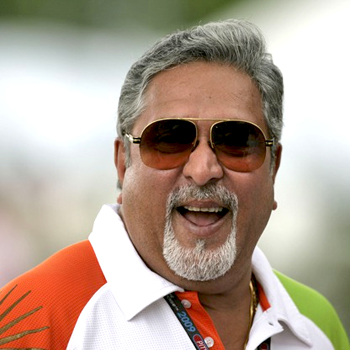New Delhi, Mar 9: A consortium of 13 banks led by State Bank of India approached the Supreme Court on Tuesday to prevent controversial tycoon Vijay Mallya from leaving the country, but they may have left it for too late. Mallya is believed to have left for a foreign destination a few days ago.
 The banks urged the court to stop him from going abroad as they claimed he owed them over Rs 9,000 crore. The banks were represented by attorney general Mukul Rohatgi, indicating the government was backing the petitioners against Mallya, who recently said he wished to settle in London.
The banks urged the court to stop him from going abroad as they claimed he owed them over Rs 9,000 crore. The banks were represented by attorney general Mukul Rohatgi, indicating the government was backing the petitioners against Mallya, who recently said he wished to settle in London.
Mallya's spokesperson said she had no information about his whereabouts and that he was communicating only through email. A consortium of 13 banks on Tuesday approached the SC, a day after a Debt Recovery Tribunal (DRT) restrained Mallya from disbursing in any manner Rs 515 crore paid to him by liquor major Diageo for exiting United Spirits. But the tribunal refused an interim order to freeze Mallya's passport.
Mallya has reportedly expressed a desire to settle in London following the Rs 515 crore deal with Diageo, the banks said through attorney general Mukul Rohatgi.
Rohatgi told a bench of Chief Justice T S Thakur and U U Lalit that there was every chance of Mallya slipping out of the country as he had told the media that Diageo would be paying him Rs 515 crore in London as fee for exiting United Spirits.
This is the reason why the petitioners moved the DRT for freezing Mallya's passport, is suance of arrest warrant against him, restraining him from disbursing Rs 515 crore ($75 million) and to seek a direction to Mallya to disclose his entire assets on oath.
The AG said the DRT restrained him from disbursing the amount due from Diageo but did not order freezing of his passport as it failed to appreciate the magnitude of the debt and the possibility of Mallya fleeing the country. The banks then approached the Karnataka High Court for the same relief but did not get any interim order.
After the AG sought an urgent hearing, the CJI posted the petition for hearing on Wednesday. The petitioner banks are SBI, Bank of Baroda, Punjab National Bank, State Bank of Mysore, UCO Bank, United Bank of India, Indian Overseas Bank, Punjab and Sind Bank, Axis Bank, Bank of Baroda, Corporation Bank, Federal Bank and IDBI Bank.
The banks said, "The HC failed to protect the interest of the petitioner banks who are yet to recover an amount in excess of Rs 9,000 crore from Kingfisher Airlines, United Breweries Ltd, Vijay Mallya and Kingfisher Finvest (India) Ltd. "Petitioner banks individually advanced to Kingfisher Airlines loans of thousands of crores of rupees. By way of a Master Debt Recast Agreement (MDRA) of December 21, 2010 and other related documents, the existing lands were restructured and treated as a single facility. United Breweries and Mallya have on December 21, 2010 executed both corporate guarantee and personal guarantee promising repayment of the entire amount due to the banks."





Comments
Add new comment